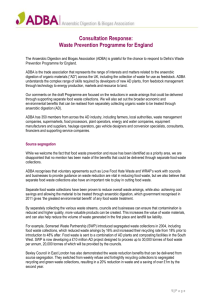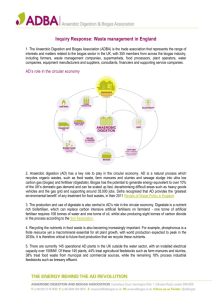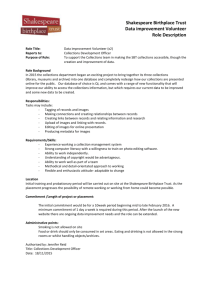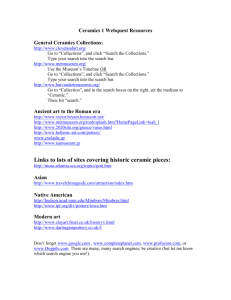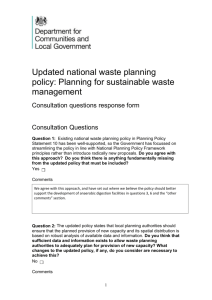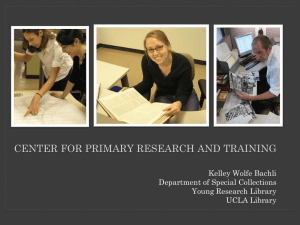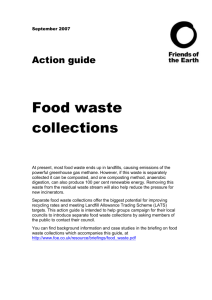130805-response-Defra-Waste-Managemen-Plan
advertisement
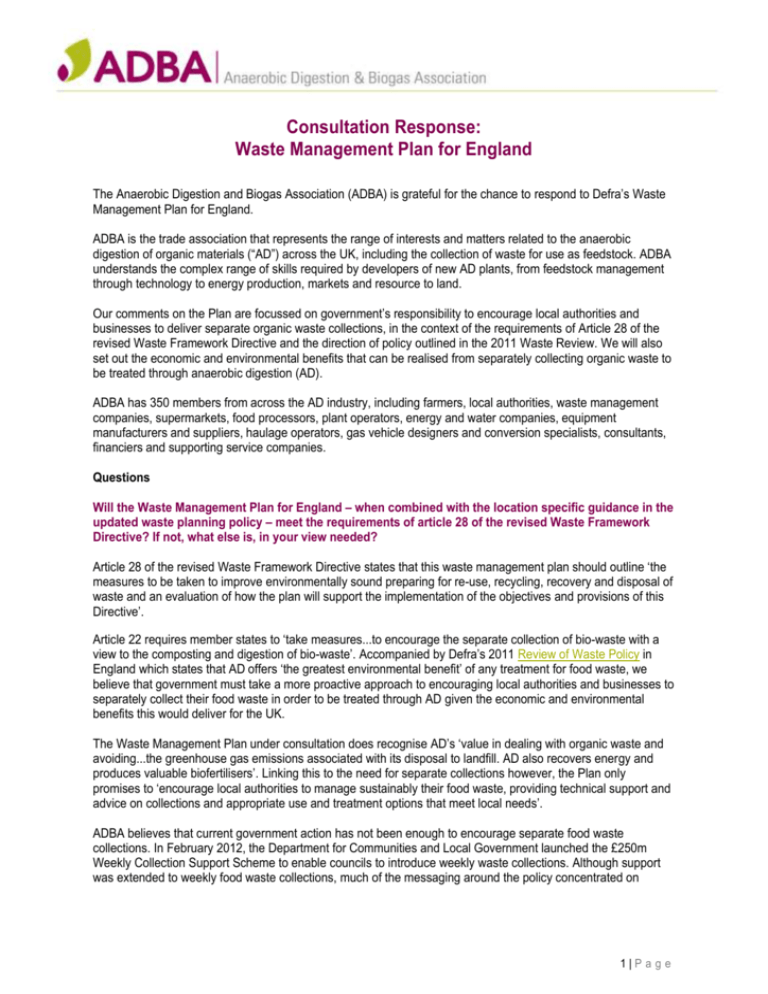
Consultation Response: Waste Management Plan for England The Anaerobic Digestion and Biogas Association (ADBA) is grateful for the chance to respond to Defra’s Waste Management Plan for England. ADBA is the trade association that represents the range of interests and matters related to the anaerobic digestion of organic materials (“AD”) across the UK, including the collection of waste for use as feedstock. ADBA understands the complex range of skills required by developers of new AD plants, from feedstock management through technology to energy production, markets and resource to land. Our comments on the Plan are focussed on government’s responsibility to encourage local authorities and businesses to deliver separate organic waste collections, in the context of the requirements of Article 28 of the revised Waste Framework Directive and the direction of policy outlined in the 2011 Waste Review. We will also set out the economic and environmental benefits that can be realised from separately collecting organic waste to be treated through anaerobic digestion (AD). ADBA has 350 members from across the AD industry, including farmers, local authorities, waste management companies, supermarkets, food processors, plant operators, energy and water companies, equipment manufacturers and suppliers, haulage operators, gas vehicle designers and conversion specialists, consultants, financiers and supporting service companies. Questions Will the Waste Management Plan for England – when combined with the location specific guidance in the updated waste planning policy – meet the requirements of article 28 of the revised Waste Framework Directive? If not, what else is, in your view needed? Article 28 of the revised Waste Framework Directive states that this waste management plan should outline ‘the measures to be taken to improve environmentally sound preparing for re-use, recycling, recovery and disposal of waste and an evaluation of how the plan will support the implementation of the objectives and provisions of this Directive’. Article 22 requires member states to ‘take measures...to encourage the separate collection of bio-waste with a view to the composting and digestion of bio-waste’. Accompanied by Defra’s 2011 Review of Waste Policy in England which states that AD offers ‘the greatest environmental benefit’ of any treatment for food waste, we believe that government must take a more proactive approach to encouraging local authorities and businesses to separately collect their food waste in order to be treated through AD given the economic and environmental benefits this would deliver for the UK. The Waste Management Plan under consultation does recognise AD’s ‘value in dealing with organic waste and avoiding...the greenhouse gas emissions associated with its disposal to landfill. AD also recovers energy and produces valuable biofertilisers’. Linking this to the need for separate collections however, the Plan only promises to ‘encourage local authorities to manage sustainably their food waste, providing technical support and advice on collections and appropriate use and treatment options that meet local needs’. ADBA believes that current government action has not been enough to encourage separate food waste collections. In February 2012, the Department for Communities and Local Government launched the £250m Weekly Collection Support Scheme to enable councils to introduce weekly waste collections. Although support was extended to weekly food waste collections, much of the messaging around the policy concentrated on 1|Pa g e supporting weekly residual collections, and this undoubtedly sent mixed messages to councils and the public about collection policy. An alternative approach has been demonstrated in Scotland where the Scottish Government has provided the legislative framework to support rolling out food waste collections across all local authorities and businesses by 2015 and for banning organic waste to landfill by 2020, under their Zero Waste Plan. Zero Waste Scotland provided £5m funding for local authorities in 2012, and £4m for the private sector. For councils, this was aimed at providing funding for food caddies, new bins and also communications to inform local residents of the changes. For businesses, the funds were also aimed at supporting separate food waste collections, as well as helping to fund enhancements to existing AD and composting infrastructure to help these facilities take full advantage of the added food waste being collected. Wales has also made important progress in delivering more effective waste management through statutory waste recovery targets. Welsh local authorities are currently required to recover (this includes AD) 52% of municipal waste, rising to 70% by 2024, and where councils recycle source-segregated food waste using AD, it will fund up to 25% of the council’s food waste treatment costs under 15 year guaranteed contracts. This has helped to facilitate a situation today whereby 88% of Welsh households have separate food waste collections, in comparison to just 13% of households in England. The UK government should closely monitor these developments in Scotland and Wales in order to learn the lessons and apply similar policies in England. Source segregation By separately collecting the various waste streams, councils and businesses can ensure that contamination is reduced and higher quality, more valuable products can be created. This increases the value of waste materials, and can also help reduce the volume of waste generated in the first place and landfill tax liability. For example, Somerset Waste Partnership (SWP) introduced segregated waste collections in 2004, including food waste collections, which reduced waste arisings by 16% and increased their recycling rate from 18% prior to introduction to 48% after. Food waste is sent to a combination of AD plants and composting facilities in the South West. SWP is now developing a £10 million AD project designed to process up to 30,000 tonnes of food waste per annum, 20,000 tonnes of which will be provided by the councils. Bexley Council in East London has also demonstrated the savings in collection costs that can be delivered from source segregation. They switched from weekly refuse and fortnightly recycling collections to segregated recycling and green waste collections, resulting in a 20% reduction in waste and a saving of over £1m by the second year. As well as the environmental and economic benefits of separately collecting food waste, we believe evidence shows that weekly food waste collections have also proven popular with local residents. An Icaro study found that households who had a weekly food waste collection awarded the service 7.9/10. This compares favourably to the public’s overall attitude to their waste collection scheme, which averaged 7.4/10. A 2011 Friends of the Earth study also found that 82% of residents who had a food waste collection supported the service. Treatment of food waste through AD As we noted earlier, government declared in their 2011 Review of Waste Policy in England that anaerobic digestion (AD) offered ‘the greatest environmental benefit’ of the main options for treating food waste. 2|Pa g e The AD industry as a whole would deliver 40 TWh of renewable gas annually if it reaches its potential in the UK. This would be worth around £2-3bn in itself, and the industry would support around 35,000 jobs. Over 60% of this potential is dependent on organic food and garden waste being diverted to AD however, and therefore government should play a more active role in supporting separate food waste collections. AD is the natural breakdown of organic material such as municipal solid waste, farm wastes, purpose grown crops and sewage sludge in the absence of oxygen. The process produces a renewable gas (biogas) and a biofertiliser (digestate) that can be spread to land, replacing synthetic fertiliser. Biogas (approximately 60% methane and 40% carbon dioxide) can be used for electricity and heat, or it can be upgraded to biomethane by removing the impurities and separating out the renewable CO2 which can be used locally or injected into the gas grid or used directly as a transport fuel. Compressed or liquefied biomethane is particularly valuable for HGVs, waste collection vehicles and buses for which there are few other renewable options currently available. Demonstrating the wider economic benefits of treating food waste through AD, WRAP has calculated that the nutrients in household food waste alone would be worth £50 million if spread to land as fertiliser, which anaerobic digestion facilitates. With mature markets the true worth of digestate, including its value as a ‘green’ product and the benefits it can offer to soil structure would be significantly higher still. Creating quality biofertilisers under existing British standards requires source segregation of food waste. If food waste is not source segregated then prohibitive environmental waste permits are required to use the digestate as a fertiliser. Good quality digestate recycling also makes an important contribution to the circular economy, recycling valuable nutrients such as phosphorous back to land, as was recognised in the recent report by the Ellen MacArthur Foundation titled “Towards the Circular Economy”. 3|Pa g e
